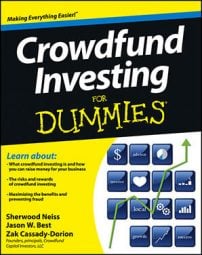On occasion, you may be asked to serve on a board of advisors for a new crowdfund investment. This entity is different from a board of directors, which must represent the rights and interests of the stockholders and can take actions on their behalf as prescribed by the bylaws of the company. A board of advisors has no formal authority over the company or the CEO.
Its function is to provide advice, know-how, connections, and (in some cases) additional financial support to the business owner. An advisory position is typically unpaid but is also very important to a new or small business.
Essentially, as an advisor you agree to be a mentor to the entrepreneur or business owner. You bring experience and a fresh perspective to whatever issues this person is dealing with. Your primary job is to offer honest, direct opinions in a respectful way.
A board of advisors also demonstrates to the outside world that the company is connected to people in the industry who are experts or powerful or successful. Affiliating with a board of advisors helps a company provide social proof to its customers or other investors that it’s on target for success.
Keep in mind that not every investor can or will be invited to join the company’s board of advisors. (The investment crowd is simply too large for that to happen.) You shouldn’t expect to be asked or be offended if the invitation doesn’t come.
If you’re asked to join the board, make sure you have the time to commit to it. The time commitment usually isn’t too intense, but during certain periods of time you may need to help in more active ways — when the business owner needs an introduction, for example, or is seeking access to angel or private equity investment.
Being asked to serve on a board of advisors is an honor but also a significant responsibility. You’re attaching your name and reputation to this company publicly, and you want to make sure that you want the public affiliation with the company, the owners, and the mission or brand.

